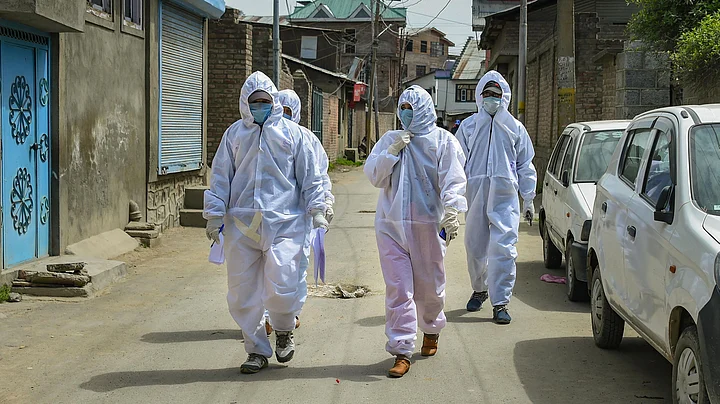India saw 41,649 new COVID-19 cases between 30 and 31 August, taking the total number of people infected in the country since the beginning of the pandemic to 3.16 crore.
Till date, the country has conducted 46,82,16,510 COVID-19 tests. About 46.16 crore doses of vaccines have been administered in the same time period.
However, latest COVID data also shows some worrying trends.
46 Districts Show Positivity Rate Higher Than 10 Percent
The government reported on 31 August that 10 states are seeing an upsurge in COVID-19 cases or rise in positivity rate.
The states are:
Kerala
Maharashtra
Karnataka
Tamil Nadu
Odisha
Assam
Mizoram
Meghalaya
Andhra Pradesh
Manipur
Cumulatively, 46 districts in these states are recording COVID positivity rate of more than 10 percent, and 53 districts are recording a positivity rate between 5-10 percent.
The Centre has asked states to ramp up testing in these districts apart from enforcing strict restrictions.
"All districts reporting positivity rate of more than 10 percent in the last few weeks need to consider strict restrictions to prevent or curtail the movement of people, formation of crowds and intermingling of people to prevent the spread of infection," said an official statement from the Indian Council of Medical Research (ICMR), reported NDTV.
80 percent of the cases reported in these districts are in home isolation.
"The people in home isolation should be effectively monitored in such a manner to ensure that those who require hospitalisation are seamlessly transferred for timely clinical treatment. Detailed SOPs covering various facets of effective clinical management of COVID-19 patients in hospitals have been earlier shared with the states for prompt shifting and effective hospital management," said the NDTV report, quoting a statement by the health ministry.
R-Value Increases Across the Country, Kerala Tops List
PTI reported that the R-value of COVID-19 in India is increasing across the country. The R-value of COVID-19 spread indicates the speed at which the infection is spreading in the country.
According to the report, Kerala and northeastern states are seeing the highest increase in R-value.
Among the metro cities, the R-values of Pune and Delhi are inching towards one, said the report, based on an analysis by researchers at the Institute of Mathematical Sciences in Chennai.
"When the number of active cases remains in the range of a few hundred and the R-value is near one, then an outbreak can be controlled much easier," said Sitabhra Sinha of the Institute of Mathematical Sciences
When the second wave of the COVID-19 infection was at its peak, the overall R-value in the country was estimated to be 1.37 between 9 March to 21 April. It declined to 1.18 between 24 April and 1 May and then to 1.1 between 29 April and 7 May, according to the analysis.
An R-value of 0.95 means, every 100 infected people on an average pass on the infection to 95 other individuals. If the R-value is lesser than one, it means the number of newly infected people is lower than the number of infected people in the preceding period which means the disease incidence is going down.
A lesser R-value indicates that the disease is on a decline.
Speaking to NDTV, Dr Randeep Guleria, chief of AIIMS, said that the increasing R-value in the country is "concerning".
"Starting from 0.96, and going all the way up to 1, the rise in R-Value is a cause of concern. Simply put, this means that the chances of infection spreading from a person, who has COVID, to others have gone up. The areas which are witnessing this surge should bring in restrictions and employ 'test, track, and treat' strategy to break the chain of transmission," said Guleria in an interview to the channel.
He further added that strict measures needed to be enforced in places like Kerala.
"In the beginning, Kerala had set a precedent for others by managing the pandemic well. They also had an aggressive vaccination drive. Yet despite that, are witnessing a spike in a way that's different from other parts of the country. This needs to be evaluated. Also, is there a variant behind the surge? Are containment strategies being aggressively followed – all this needs to be evaluated," Guleria said.
(With inputs from PTI and NDTV)
